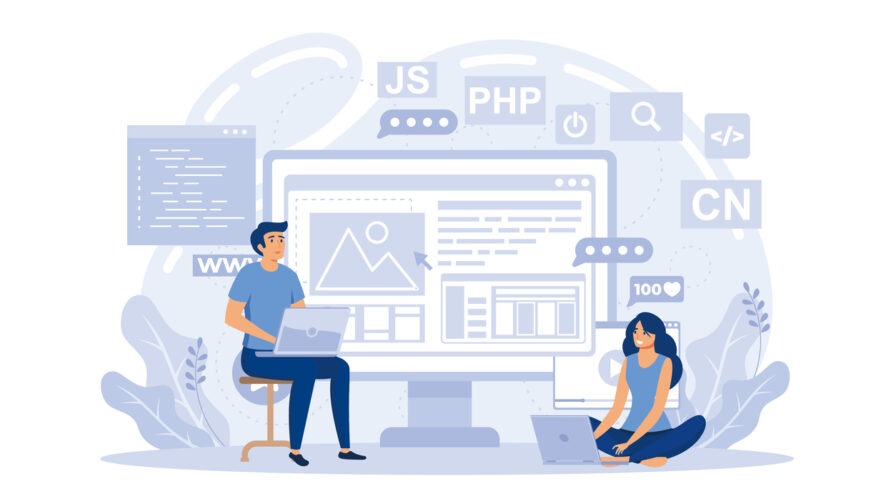
Software development is one of the fastest-evolving industries since new technologies and programming languages are constantly making their appearance on the market.
A rapidly changing industry means that software developers need to be up to date with the skills that are in demand now, but also with those that will be most valuable in the near future.
With this in mind, a developer’s CV should include both hard and soft skills, the latter being of increasing importance in today’s tech scene. Continue reading to find out which skills you need to succeed in software development.
1. Trending hard skills and languages
According to The European Software Skills Alliance, the most in-demand hard skills and languages that software developers will need from 2022 onwards are:
– Languages: Java, Javascript, SQL, HTML, PHP, C++, C# and Python
– Hard Skills: Testing and debugging, algorithm skills, DevOps skills, security skills, Agile skills
Let’s look at each one of these in detail.
Top trending languages in software development
According to research conducted by The European Software Skills Alliance, the most in-demand programming languages in 2022 are:
Java
This object-oriented language has maintained its popularity for more than two decades, and remains in demand today as it powers many commercial websites and applications.
Java is easy to learn and easy to deploy, whether it’s on a single machine or across an entire network thanks to its platform-independent nature.
Java will continue to be useful in the future, even with the widespread adoption of new technologies. For example, Java is still needed to support server-side operations in machine learning projects, and it also has applications in Big Data and Internet of Things.
Javascript
Javascript programming skills are highly sought after. In some markets, more than a third of all IT vacancies require Javascript knowledge.
This client-side language is largely responsible for front end website functionality, and since it’s essential for user interaction, we can say with certainty that the need for Javascript skills is here to stay.
Moreover, Javascript isn’t only required in websites, but it’s also used to develop other software applications, such as video players, web-based video games, mobile and virtual reality applications.
SQL
SQL is another well-established language that continues to be in demand decades after its creation. This language plays a crucial role in different types of database management activities. And since data management underpins many consumer services today, SQL is more important than ever.
In addition, SQL skills are needed in data science and big data and to power data-centric analysis at large scale, which is why this language is used by giants like Meta and Amazon.
HTML
Knowledge of HTML is a basic of web development. This markup language is the main framework on which websites are built, but it has additional applications such as game development, Internet navigation, and browser storage functions.
Although software development roles don’t involve building websites, HTML skills are useful in software engineering projects and in tasks that require collaboration with web developers.
PHP
PHP is a server-side scripting language that according to some sources, powers 70% of websites today.
Beyond its functionality in website development, PHP skills are typically needed in e-commerce projects, content management systems, and plugin development.
PHP frameworks are also heavily used in cloud services, Internet of Things integration, web security, and chatbot implementation.
C++
Every software developer should be familiar with C++, since most projects will require working with this object-oriented language to some extent.
Common use scenarios include game and operating system development, simulations, browser applications, cloud storage implementation, and database management.
C#
C# has been part of the skill set of most software developers since the early 2000s. This programming language is widely used to support back end services, .NET applications, Windows services, and to create functionality for websites and games.
Python
Python is a relative newcomer to the programming world, but in a short period of time it has become one of the most in-demand languages due to its concise and extensible nature and versatility.
The range of applications powered by Python continues to evolve, and extends from secure web frameworks to GUI applications, game development, enterprise applications, and as a support language when testing and managing software products.
Top hard skills in software development
Hard skills are the specific skills needed to be professionally competent in any given industry. In the software development sector, hard skills are mainly technical and necessary for software production and maintenance.
Testing and debugging
These processes are an integral part of software development, since all projects need to be tested and debugged to identify and resolve code, syntax, data, or logic errors that could interfere with software functionality and security.
Algorithm skills
Software development involves more than writing lines of code. Professionals who are conversant with algorithms are a great asset to any IT organisation, since these skills are essential in determining how to strategically optimize data and information in a software programme.
DevOps skills
DevOps skills are deemed even more important than testing skills by some employers. Research conducted by The European Software Skills Alliance shows that DevOps experts will be more in demand in 5 years than they are now.
These skills are crucial since they enable better collaboration between IT staff, therefore enhancing efficiencies and improving the quality of software development projects.
Some key DevOps skills include security, Linux, automation, cloud computing, and testing.
Security skills
Security skills are fundamental to build robust software products and to increase the security parameters of existing programmes and applications.
Common security skills needed in software development include network and system analysis, ethical hacking, forensics, auditing, and penetration testing.
Agile skills
Agile methodology facilitates the development of quality software products and reduces delivery time. As a result, Agile skills are in demand due to their contribution to productivity in software development environments.
Some key Agile skills for software developers include scrum, agile architecture, scaling, database management, collaboration, lean software development, and kanban.
2. Trending Soft Skills Today
Soft skills are important since software products are created by people for people. Therefore, it’s necessary to complement technical knowledge with personal and interpersonal skills.
Soft skills are transferable, which means they can be brought from other industries or job roles into software development.
Here is a list of some top personal soft skills for software developers: critical thinking & analysis, problem solving, self-management, emotional intelligence, adaptability and creativity.
Critical thinking is essential in the software development process as it presents challenges that can only be solved with an analytical mind. Some issues can be anticipated with critical thinking skills, which are highly valued by IT employers.
Problem solving is the ability to identify and solve issues in a creative and efficient manner. It involves both critical thinking and creative thinking, as well as a willingness to take risks. This soft skill is key in software development.
Self-management means to effectively manage one’s time, resources, and emotions. It involves setting goals, making plans, and taking action. Working in this industry requires the ability to function in fast-paced environments, which is why this skill is essential for any software developer who has long-term career ambitions.
Emotional intelligence is the ability to be aware and understand your own emotions and the emotions of others. It is a key soft skill that can help you to better manage relationships, resolve conflicts, and make better decisions.
Adaptability helps to change and respond to new situations and challenges. It is a key soft skill that can help you to better cope with change, handle stress, and solve problems.
Creativity is paramount in software development. This key soft skill can help you to better solve problems, think outside the box, and come up with innovative solutions.
Top interpersonal soft skills for software developers: teamwork, communication, and English.
Creating successful software is a team effort, which means that developers need to be able to communicate and understand project requirements and collaborate with team members and with project stakeholders.
It’s now common for IT teams to be located in different countries or continent, which is why English has become the de facto language in software development. Moreover, technical aspects like project requirements, documentation, and programming languages are mainly in English.
3. Looking forward: An AI-dominated Market
Following recent advances in AI technology, we have seen that AI-powered applications can now write code, and their programming capabilities are constantly improving. This has sparked concerns about the possibility that AI may soon replace developers.
The prospect of an AI-dominated market shouldn’t discourage people considering a career in software development. Artificial intelligence will continue to require human input, so this technology won’t replace software developers. In the future, software development roles will likely switch direction towards scenarios where creativity, data science and conceptualization will play a big role.
However, this trend will continue to grow and transform the market. Therefore, it’s in every developer’s best interest to leverage, understand, and know how to work with AI tools.
For example, it’s worth learning to use AI as a support tool that can handle repetitive or menial software development tasks. AI can also take over automation and compilation processes, as well as debugging and testing.
As a developer, you can capitalize on the inherent strengths of AI tools to become more efficient and save time, which can then be used to adapt to new market requirements.
Some quick CV-building tips for devs
• Choose 3 technologies to focus on
• Be honest
• Avoid commonplaces
• Keep it simple: avoid long and complex CV formats
• Create different CVs for different positions, personalised to role and organisation
• Research the company and adapt the way you present your skills to their corporate culture
Conclusion: Go get it!
Becoming a software developer requires dedication and continuous learning. With the right strategy, you can equip yourself with skills that will help move your career forward in tech environments. Utilize this article to gain insight, but remember the industry of software development is an ever-evolving environment, be always ready and willing to acquire new skills and never stop studying!
If you’re ready to shine as a developer, we invite you to explore the open vacancies at Luxoft.





